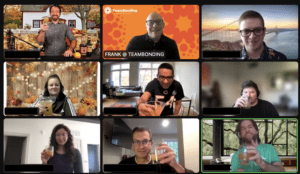Where has all the meaningful work gone? On average, about half of employees find their work meaningful, which greatly impacts their quality of work. Employees who don’t find their work meaningful are less productive, less engaged, and less likely to stay long-term at a company. On the flip side, employees with meaningful work are motivated, accomplished, and usually determined to stay long-term and work toward leadership positions.
In our podcast episode, How to Inspire Change From Within, we spoke with Thomas Bertels of Purpose Works about the need for change in modern workplaces, and how he’s working with companies to bring positive company culture and productivity into the workplace. During our discussion, Bertels noted that:
“When we try to improve an organization, we oftentimes treat people as the dependent variable. We touch everything else first. We’re looking at structure, we’re bringing new technology, we fix the process, and then we’re kind of turning around and trying to sell that to the people who actually have to live with it.”
The people on your team are the biggest factor for success or failure, and you can help set them up for success by giving them a meaningful workplace. This sets the stage for today’s blog, where we delve into exactly what makes a workplace meaningful, leadership’s effect on job meaningfulness, and how to build a meaningful workplace.
What Makes Work Meaningful?
Meaningful work is work that helps employees to feel fulfilled and valuable. There are several ways that work can be meaningful, but some of the most popular include: supporting personal and professional growth, providing a shared purpose, and having work that helps others.
In today’s corporate landscape, where employees suffer from disengagement and lack of motivation, meaningful work is more important than ever. If you’ve heard the phrase “quiet quitting,” which is the practice of doing the bare minimum of your job instead of the best of your ability, you know how common the movement of job disengagement is. When people lack meaningful work, it hurts everything, including the work. On the other side, when people have purposeful work, there’s holistic improvement across the entire organization. Here are the three main benefits of meaningful work:
Improved Job Satisfaction
People who are happy with their jobs make the workspace a positive place. Everyone wants to work with people who are excited to be there and enjoy what they do–and that job satisfaction can transform your entire team. People give their all to causes they care about, and if their job is one of those causes, then they’ll bring their A-game and be satisfied with what they do.
Higher Employee Retention Rates
Employees who are satisfied with their jobs stay with their jobs. On average, people who find their work meaningful stay at jobs an average of 7.4 months longer than those who lack meaning in their work. Retaining a higher number of employees allows your organization to enjoy the benefits of having consistently experienced and effective employees in the long term.
Increased Productivity and Innovation
If you find your work meaningful, you want to do it well. Employees who do meaningful work tend to put in an extra hour each week and take two fewer days of paid leave each year. The difference between an average work experience and a meaningful work experience can add up to over $9,000 worth of extra labor output each year.
Leadership Mistakes That Affect Job Meaningfulness
As a leader in your company, you’re responsible for how your employees perceive their work. Your actions and policies can add or detract meaning from your team’s experience. Here are five major mistakes that can affect how your employees see their jobs.
1. Lack of Clear Vision and Purpose
Purpose matters. If your business doesn’t have core values that employees can turn to, they won’t be motivated to go the extra mile to achieve that “Why.” Having a unified sense of purpose is a great way to keep employees motivated and passionate about the work they do.
2. Setting Unrealistic Expectations
No one enjoys feeling like a failure. Setting unrealistic expectations can lead to constant frustration and disappointment among your team members. If employees are consistently falling behind on projects or staying late to meet deadlines, it might be time to re-evaluate your expectations.
3. Neglecting Professional Development
If you’re sure that your expectations for your employees are realistic for your field, but they still aren’t meeting those expectations, then perhaps the problem lies in professional development.
Ongoing professional development is key in any field for many reasons. It can keep infrequently used skills sharp, improve challenge areas, and introduce new skills. This is especially important in today’s world, as technological advances are transforming fields and new skills are in demand every day. Thomas alluded to the importance of professional development in our chat:
“A lot of leaders that I know really want to develop people, right? I mean, yes, we have objectives. We’ve got to meet our numbers, but people take pride in the accomplishments of others.”
4. Failure to Recognize and Reward
Recognition and rewards are valuable for helping promote engagement. If someone goes the extra mile to finish a project on time despite complications, that effort deserves to be recognized. If someone finds a way to improve a work process’s efficiency, that innovation deserves to be rewarded.
Recognition and rewards can take a lot of different forms, depending on your business and your company culture, but they’ll always include a personal acknowledgment and thanks for your employee’s achievements and contributions.
5. Insufficient Collaboration and Team Building
There’s one thing that every sports movie has in common: a team building sequence. Friends and people united around a common cause always work better together than strangers do. It’s true in sports, and it’s true in the workplace.
A leadership style that focuses on the individual people of the company and supports collaboration and teamwork leads to efficient and innovative teams. People brainstorm better with people they trust, and collaborators who care about each other will pick up the slack when someone has an off day.
Making Work Meaningful for Employees
Now that you know what mistakes to avoid, here are six actions you can take to be proactive about building a meaningful workplace.
1. Align Company Values with Employee Roles
Having a shared value and making everyone aware of their role in achieving that goal is a great way to add meaning in your workplace.
For example, let’s say you’re running a plumbing business. Your employees include plumbers and a secretary who sets up appointments and paperwork. Your plumbing team might get to see the impact that they have firsthand when they see relieved customers, but your secretary might not. Helping your secretary understand that he’s the first step in a process that leads to customer satisfaction can help him find value in his job – he’s the voice of hope that signals that things are about to change for stressed customers.
2. Provide Opportunities for Growth and Development
Professional development helps employees feel confident in their skills and qualified to tackle new challenges. One way to practice professional development is to sign up for a group training program.
TeamBonding offers Professional Development Workshops online to allow any company, anywhere, to improve their skills as a team. Learning together helps build team cohesion, and at the end of the workshop, your whole team will feel more confident in their roles and understanding of others’ contributions.
3. Foster a Culture of Recognition and Appreciation
People want to be recognized for the hard work they do, which is why building a company culture of recognition and appreciation leads to employee satisfaction and retention. One way to show your appreciation is to reward your employees for hard work with fun events.
If you’ve just completed a challenging group project, you can reward your team with a fun event, like a Virtual Happy Hour and Mixology Class! Having fun together is another great way to promote team cohesion, and it gives everyone a chance to relax and feel appreciated by leadership.
4. Encourage Autonomy and Empowerment
There’s a reason that “micromanaging” is a negative word. By giving your employees all the tools to be successful through training and professional development, you should be able to encourage autonomy in your workday. Empowering a team to set their own deadlines for a project can help them take responsibility for their work, and inspire innovation and achievement, as explained by Thomas:
“I think we’re just tapping into that feeling that everybody has of wanting to make a positive impact on the world. Why not allow your employees to take more ownership and have a bigger role in the company?”
5. Promote Work-Life Balance
Work-life balance is key for anyone who wants to have a fulfilled life. “Life” includes family, friends, personal growth, and anything else that people pursue on their own time. Having a work-life balance is key to having employees feel fulfilled and accomplished.
According to a recent survey, 60% of Americans report having an unhealthy work-life balance, and that can lead to burnout at work and tension at home. By promoting a healthy work-life balance, you’ll be showing your employees that you care about them as people. This can lead to greater work commitment and engagement, as well as just a better team atmosphere.
6. Facilitate Teamwork and Shared Purpose
You can support team development in your workplace by giving your team a shared activity to do beyond work. For example, you could have a group volunteer day to give back to your community. TeamBonding has a program called the Do Good Bus, which takes your team to a volunteer event and handles all the planning for you.
Team building isn’t just for in-person workers. Virtual teams can engage with trivia and challenge games online through programs like Impact Online, which has sustainability-focused challenges designed to help your team build trust, find a shared purpose, and have fun at the same time.
Find the Meaningfulness of Work With TeamBonding
Now more than ever, meaningful work matters. Technology makes it easy for employees to check out and disengage, but that only leads to dissatisfaction and frustration. Improve your team’s work and satisfaction by prioritizing meaningful work. Give your employees the skills to be successful and the knowledge that they are making a difference, and watch them soar!
At TeamBonding, our mission is to provide team building events that give your team a sense of purpose and improve their quality of work. Get in touch with us to help make your workplace a meaningful space!

















